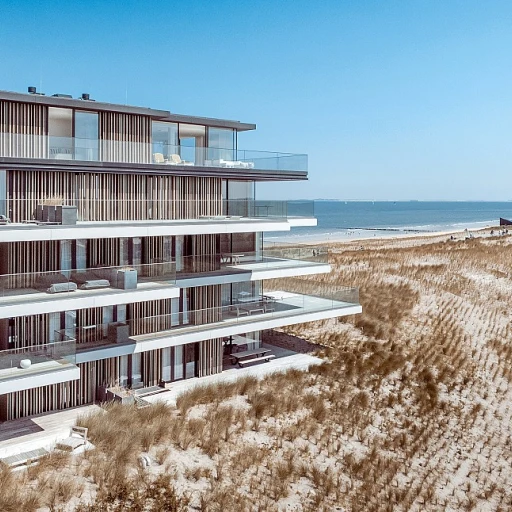
Defining fractional ownership in exclusive estates
What Sets Fractional Ownership Apart in Luxury Estates
Fractional ownership has become a popular model for those seeking a stake in exclusive estates without the commitment of full ownership. Unlike traditional timeshares, fractional ownership allows buyers to purchase a real equity share in a high-value vacation property. This means you actually own a portion of the real estate, not just the right to use it for a set period each year.
In exclusive estates, fractional properties are typically managed by a professional property management company or a residence club. This ensures that maintenance, management, and upkeep are handled to the highest standards, preserving the value of your investment property. Owners share the costs, including maintenance fees and management expenses, making it a more accessible way to enjoy luxury living.
- Equity stake: Owners hold a deeded share in the property, which can appreciate over time.
- Flexible usage: Fractional ownership often provides more flexible vacation time compared to traditional timeshares or vacation clubs.
- Long-term value: Because you own real estate, there’s potential for capital gains if the property’s value increases.
- Professional management: Most fractional ownership models include comprehensive property management, reducing the hassle for owners.
This shared ownership approach is particularly attractive for those who want the benefits of owning a luxury residence but prefer to split the costs and responsibilities. It’s also a strategic choice for buyers interested in understanding the timeline of a luxury property flip and maximizing their investment in the long term.
As we explore other ownership models like timeshares and vacation clubs, it’s important to consider how each structure aligns with your lifestyle and investment goals. The right choice depends on your desired level of control, usage flexibility, and financial commitment.
How timeshare operates in the luxury property market
How luxury timeshare models shape vacation property access
Timeshare arrangements in the luxury real estate market have evolved far beyond their traditional roots. In exclusive estates, timeshares are often marketed as vacation clubs or residence clubs, offering owners the right to use a high-end property for a set period each year. This model allows individuals to enjoy a premium vacation property without the full commitment of outright ownership.
Ownership in a timeshare is typically divided by time, not equity. Owners purchase the right to occupy a residence for a specific week or weeks annually, rather than holding a share of the real estate asset itself. This distinction is key when comparing timeshare to fractional ownership, where buyers hold a deeded interest in the property and thus a share of the underlying equity.
- Usage rights: Timeshare owners have access to the property during their allotted time, often rotating each year to ensure fairness among participants.
- Property management: Maintenance and management are handled by a professional company, with costs covered by annual maintenance fees paid by all timeshare owners.
- Flexibility: Some luxury timeshares offer exchange programs, allowing owners to swap their time at one property for another within the same vacation club network.
While timeshares provide a pathway to enjoying exclusive estates, they do not offer the same investment potential as fractional ownership models. Owners do not build equity in the property, and resale values can be unpredictable. However, for those seeking predictable vacation time in a prestigious setting without the complexities of full ownership, timeshares remain a popular option in the luxury segment.
For those interested in unique opportunities within exclusive estates, such as vineyard properties, you can explore an exceptional vineyard opportunity that exemplifies the diversity of luxury real estate offerings available today.
Key differences between fractional ownership and timeshare
How Shared Ownership Models Differ in Practice
When comparing fractional ownership and timeshare in exclusive estates, the differences go far beyond just the time you spend at the property. Both models offer access to high-end vacation properties, but the structure of ownership, financial implications, and management responsibilities set them apart in meaningful ways.
- Equity and Ownership: Fractional ownership means you actually own a real share of the property. This gives you equity, which can appreciate over time. In contrast, a traditional timeshare typically grants you the right to use the property for a set period each year, but you don’t own any real estate. This distinction affects your long-term investment potential and resale options.
- Usage Rights: With fractional properties, owners usually enjoy more flexible and extended stays, often several weeks or even months per year. Timeshare owners, on the other hand, are limited to a specific week or set period, often with less flexibility to change dates or locations unless part of a vacation club or exchange program.
- Management and Maintenance: Fractional ownership often comes with professional property management and higher service standards, as owners have a vested interest in maintaining the estate’s value. Maintenance fees are typically higher, reflecting the luxury services and upkeep. Timeshares, especially traditional models, may have lower annual costs but also less personalized management and fewer amenities.
- Exit Strategies: Selling a fractional ownership share is more like selling real estate, with potential for value appreciation. Timeshares are generally harder to resell and may not retain value, as they are seen as a prepaid vacation product rather than a true investment property.
Understanding these differences is crucial for exclusive estate owners who want to align their lifestyle and investment goals with the right ownership model. For a deeper dive into how these models interact with broader market trends, explore this analysis of the real estate market in the US and Dubai.
Financial implications for exclusive estate owners
Understanding the Financial Realities of Shared Ownership Models
When considering exclusive estate ownership, the financial implications of fractional ownership and timeshare models are crucial. Both offer access to luxury properties, but the way costs and benefits are structured can impact your long-term investment and lifestyle.
- Initial Investment: Fractional ownership typically requires a higher upfront payment compared to traditional timeshares. This is because you are purchasing a real equity share in the property, not just the right to use it for a set period each year.
- Ongoing Costs: Both models involve maintenance fees, but the structure differs. Fractional owners share the actual costs of property management, repairs, and upgrades, reflecting their real estate stake. Timeshare owners pay annual fees, which may not always align with the true cost of maintaining a luxury residence.
- Value Retention: Fractional properties often retain value better over time, as owners hold a deeded interest. This can make resale or inheritance more straightforward. In contrast, timeshares generally depreciate, and reselling a timeshare can be challenging due to market saturation and limited demand.
- Rental and Exchange Opportunities: Some fractional ownership models and residence clubs allow owners to rent out their share or exchange time with other properties, potentially offsetting costs. Timeshare programs, especially vacation clubs, may offer exchange networks, but these rarely provide the same financial flexibility or returns as owning a share of the real estate.
- Long-Term Investment: Fractional ownership is often viewed as a more robust investment property option, with the potential for appreciation and capital gains. Timeshares, on the other hand, are primarily about prepaying for vacation time, not building equity.
Exclusive estate owners should carefully assess these financial factors, considering both the immediate costs and the long-term implications for wealth preservation and lifestyle flexibility. The right choice depends on your priorities—whether you value true ownership and potential appreciation, or simply want predictable access to a luxury vacation property without the responsibilities of full ownership.
Legal and management considerations
Legal Frameworks and Owner Responsibilities
When considering shared ownership models like fractional ownership and timeshare in exclusive estates, understanding the legal and management landscape is crucial. Each model comes with its own set of legal documents, rights, and obligations that can significantly impact your experience as an owner.
- Fractional ownership typically grants owners a deeded share of the real estate. This means you hold actual equity in the property, similar to traditional real estate ownership. Your share is legally recognized, and you may have the right to sell, transfer, or will your interest.
- Timeshare arrangements often provide a right to use the property for a specific period each year, but without actual ownership of the real estate. Most traditional timeshares are structured as a right-to-use contract, which expires after a set number of years.
Management Structures and Maintenance
Property management is another area where these models differ. In fractional properties, owners are usually part of a residence club or association that oversees the management and maintenance of the estate. This group collectively makes decisions about the property, from annual maintenance fees to long-term improvements. Owners share the costs and responsibilities, and the management is often more transparent and responsive to owner input.
With timeshares, a third-party management company or vacation club typically handles the property. Owners pay annual maintenance fees, but have less say in how the property is managed or maintained. This can lead to less flexibility and control over your investment property.
Transferability and Exit Strategies
Another key legal consideration is the ability to transfer or exit your ownership share. Fractional ownership often allows for easier resale or transfer of your equity share, as it is treated like real estate. Timeshares, on the other hand, can be more challenging to resell due to limited demand and restrictive contracts.
Before buying vacation property through any shared ownership model, it is essential to review all legal documents, understand your rights and obligations, and consider the long-term implications of your investment. Consulting with a real estate attorney experienced in ownership fractional and timeshare arrangements can help ensure your interests are protected.
Choosing the right model for your lifestyle and investment goals
Aligning Ownership Models with Your Lifestyle
Choosing between fractional ownership and a timeshare for your exclusive estate is more than a financial decision. It’s about matching your lifestyle, vacation habits, and long-term goals with the right property ownership model. Both options offer access to luxury real estate, but the experience and obligations can differ significantly.
Questions to Guide Your Decision
- How often do you plan to use the vacation property? If you want flexibility and more time at your residence, fractional ownership typically provides a larger ownership share and more weeks per year compared to traditional timeshares or vacation clubs.
- Are you seeking equity and potential appreciation? Fractional properties often grant real equity in the estate, allowing owners to benefit from property value increases. Timeshares, on the other hand, rarely offer real estate equity or long-term investment potential.
- What level of property management and maintenance do you prefer? Both models usually include professional property management and maintenance fees, but the scope of services and owner responsibilities can vary. Residence clubs and fractional ownership properties may offer more comprehensive management, while timeshare maintenance costs are often fixed but less customizable.
- Do you value flexibility in vacation destinations? Vacation clubs and some timeshare programs allow owners to exchange time at their property for stays at other locations. Fractional ownership is typically tied to a specific estate, offering a more consistent experience.
- What is your exit strategy? Consider the resale market and transferability. Fractional ownership shares in exclusive estates can be easier to sell than traditional timeshares, which may have more restrictions and lower demand.
Matching Investment with Personal Use
Owners who prioritize long-term value and a sense of true ownership may gravitate toward fractional ownership. This model can provide a tangible stake in the property, potential for appreciation, and a more personalized vacation experience. Those seeking predictable costs, less commitment, and the ability to travel to different destinations each year might find timeshares or vacation clubs more appealing.
Ultimately, the right choice depends on your vacation patterns, investment goals, and how much control you want over your real estate asset. Carefully review the legal structure, management agreements, and financial implications of each model before making a decision. Consulting with a real estate advisor experienced in exclusive estate ownership can provide valuable insights tailored to your unique needs.












